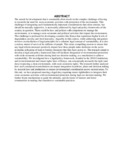| dc.description.abstract | The search for development that is sustainable often results in the complex challenge of having to reconcile the need for socio-economic activities with protection of the environment. This challenge of integrating such fundamentally important considerations that often contrast, but should be mutually supportive, is necessarily addressed by legal and policy frameworks of the country in question. These could be laws and policies with competence to manage the environment, or to manage socio-economic and political activities that impact the environment. This challenge is profound for developing countries like Kenya that experience higher levels of degradation, poverty and food insecurity. Arguably in this context, while addressing integration involves reconciliation of legal principles for a coherent legal concept of sustainability, it is also a serious matter of survival for millions of people. This raises compelling reasons to ensure that any legal reform measures positively impact how these people make decisions on the socio-economic utilization of land or forestry resources that they have access to. The research aimed to develop a legal and policy framework that will facilitate integration of environmental protection with socio-economic activities during land use decision making, as a mechanism to achieve sustainability. We investigated how a legal/policy framework, founded in the 2010 Constitution, and in environmental and tenure rights laws of Kenya, can conceptually reconcile the right (and duty) respecting a clean environment, with socio-economic rights. The research further analysed how such conceptual reconciliation can impact integration in policies, plans and decision making by sectoral laws and institutions to ensure environmental consideration across sectoral areas. To this end, we have proposed enacting a legal duty requiring tenure rightholders to integrate their socio-economic activities with environmental protection during land use decision making. We further frame mechanisms to guide the attitudes, and decisions of farmers and forest communities in making that transition to sustainable practices. | en |

